Hazel and Willow Hurdles
Traditional willow and hazel hurdles and screens have always been a popular choice with homeowners and garden designers thanks to their ability to fit into almost any space and their rustic and natural appearance that will enhance both country or urban gardens.
They are made from coppiced willow and hazel—using the traditional, eco- friendly and sustainable process of cutting back branches to ground level to stimulate fresh growth year after year.
Hurdles also make ideal garden fences because they are excellent windbreaks as the weave of the hurdle lets a small amount of wind filter through thus reducing the vortex effect that would be caused by a solid barrier.
Maintenance of Willow and Hazel Hurdles
Getting the most out of your natural fence panels
Both Hazel and Willow panels are natural products and will have a finite life. The lifespan of hurdles will vary according to their position, geographical location, exposure of the site, and the way they have been erected. Indeed, a garden fence in a very exposed or wet site might not last as long as one in a drier climate. As a very rough guide, expect hurdles and screens to last up to five years in very wet and windy conditions and up to ten years in a drier, sheltered location.
Many people prefer to let the hurdles age naturally to beautiful grey, but treating them regularly with linseed oil diluted in turpentine or any other suitable “off-the-shelf" wood preserver will help to prolong their lifespan considerably.
Erecting this natural fencing product properly and lifting it above ground level to allow an air passage will also help.
Alternatively, you can choose to grow climbers like clematis or honeysuckle over the hurdles to help keep them together when they start to deteriorate and eventually turn them into a natural hedge.
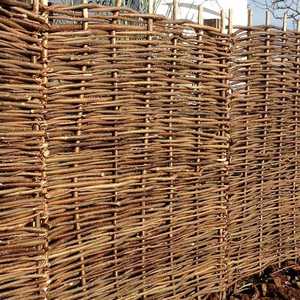
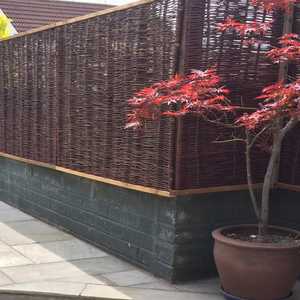
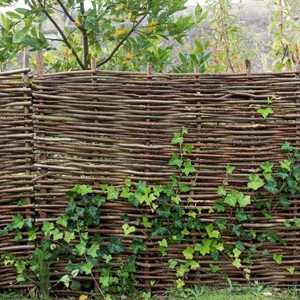
Erecting willow and hazel hurdles
A handy guide for natural garden fence panels
To get the best from your willow and hazel garden hurdles it is important that you erect them properly. Framed hurdles are slightly easier to erect while unframed look less formal. In Britain, we traditionally use unframed panels.
The choice of support can be either round stakes/posts or square-sawn posts. Hurdles can either be screwed into posts or attached with garden wire. When using round stakes/posts, wire may be more appropriate.
For sawn posts, you may prefer to butt them together and then fix with screws, in which case you may find a washer helps secure the hurdle. 100mm x 100mm posts will provide a larger surface to fix to. For the lower hurdles 18" or 460mm in the ground should be sufficient. For a 6' or 1.8m high hurdle, we would suggest 2' or 600mm in the ground, concreted in exposed sites.
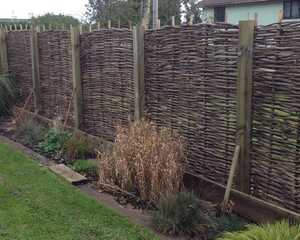
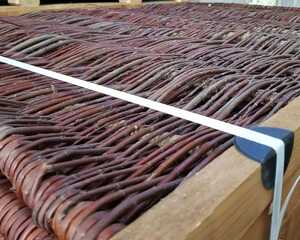
Round stakes/square post
For 4' or 1.2m high hurdles, we suggest the 1.65m x 100mm round stake. This high-quality stake has been machined to a uniform size and pressure treated for a longer life.
For 6' or 1.8m hurdles, we suggest 2.4m x 100mm x 100mm uniform stake which is also machine-cut to size and pressure treated for added durability.
Sawn posts
For 4' or 1.2m high hurdles, we suggest 1.8m x 75 x 75 pressure-treated garden fence posts.
For 6' or 1.8m hurdles, we suggest 2.4m x 100 x 100 sawn posts which have also been pressure treated using timber obtained from sustainable sources.
Heavy-framed willow hurdles are the sturdiest option as the frame gives greater rigidity. The fixing recommendations are the same as for unframed hurdles, but you will find fixing framed hurdles is simpler and the whole fence is more robust.
Cutting to size
Hurdles can be cut easily to reduce the height and it is always better to overlap adjacent hurdles to reduce width rather than cutting them as they can become unwoven.
PLEASE NOTE: Hurdles are a natural product and as such every hurdle is slightly different. Sizes are for guidance only and will vary: match each space to the actual panel.
How can we help?
It's important to remember that the information and advice in this article is provided in good faith and is designed to give general information and guidance. Any reliance you place on such information is therefore strictly at your own risk. If in doubt we strongly recommend you seek professional assistance.
If you need further advice with your purchase please get in touch with our experienced staff, we will be happy to help!

